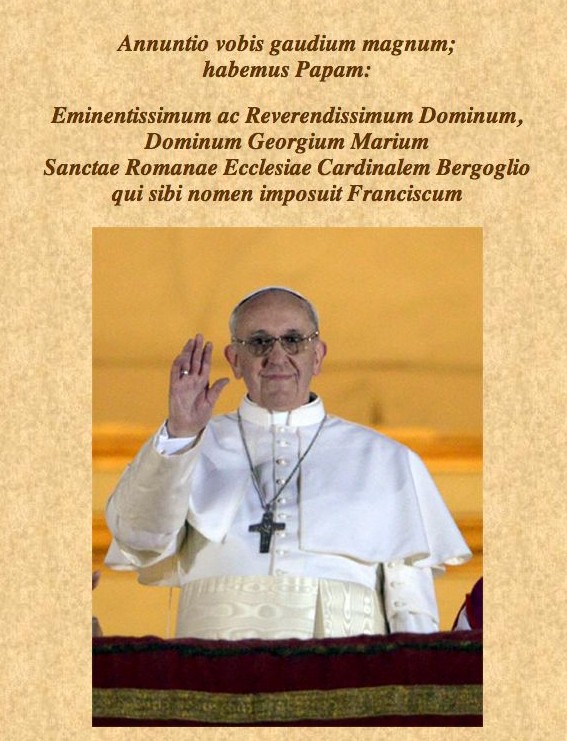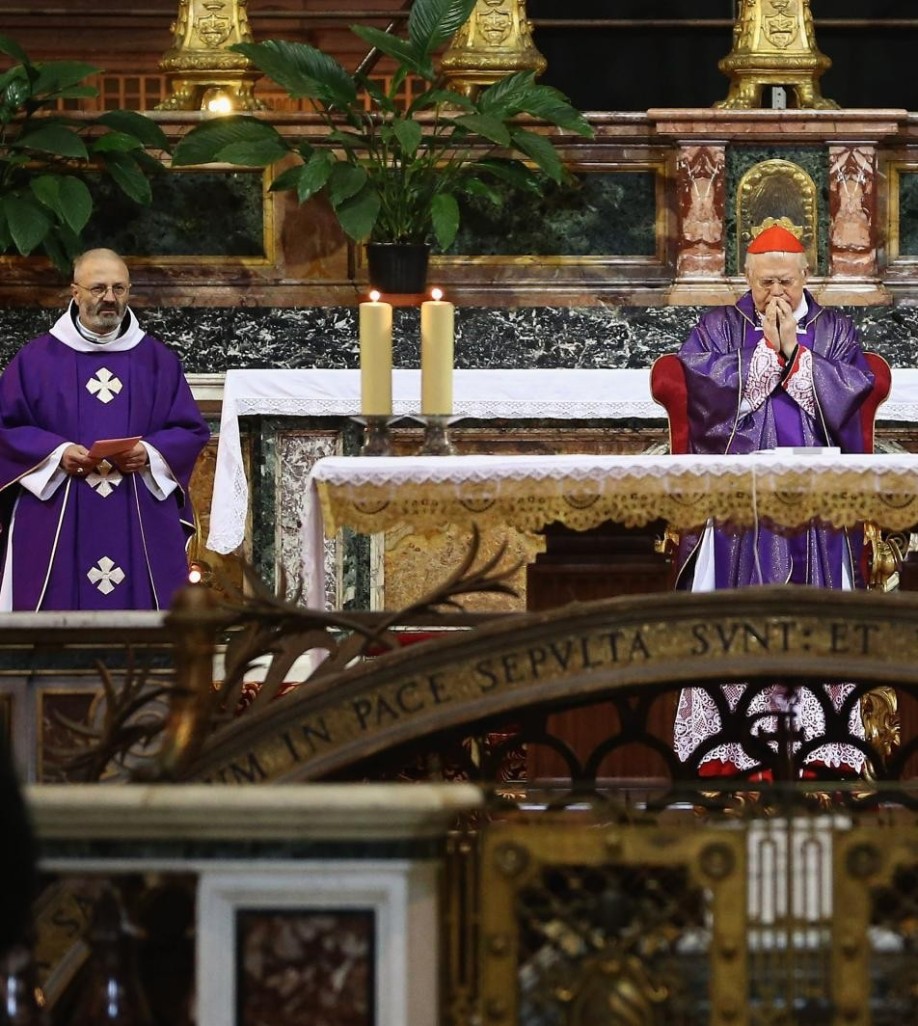In the first draft of the Second Vatican Council’s Pastoral Constitution on the Church in the Modern World the famous first words, “gaudium et spes, luctus et angor,” (joy and hope, grief and anguish) were ordered differently: “luctus et angor, gaudium et spes.” But the Council father’s decided that entitling the document “Luctus et Angor” would not be as appropriate so that switched “gaudium et spes” to the beginning. “Gaudium et spes” are also what first of all mark my reaction to the election of a new pope: both simply because we have a new pope, and because of the particular characteristics of the man chosen.
Gaudium et Spes
General Reasons
The mere fact that we have again have a pope is a great joy and a sign of hope. A great, gaudium magnum, because the bishop of Rome is the vicar of Christ on earth, the Pastor of the Lord’s universal flock, the Prince of the Apostles, to whom are entrusted the keys of the Kingdom of Heaven. And therefore he is a sign of hope to whom we pledge our obedience with great confidence. As Bl. John Henry Newman put it:
[In] obeying him, we are obeying his Lord. We must never suffer ourselves to doubt, that, in his government of the Church, he is guided by an intelligence more than human. His yoke is the yoke of Christ, he has the responsibility of his own acts, not we; and to his Lord must he render account, not to us. Even in secular matters it is ever safe to be on his side, dangerous to be on the side of his enemies. Our duty is,—not indeed to mix up Christ’s Vicar with this or that party of men, because he in his high station is above all parties,—but to look at his formal deeds, and to follow him whither he goeth, and never to desert him, however we may be tried, but to defend him at all hazards, and against all comers, as a son would a father, and as a wife a husband, knowing that his cause is the cause of God.
Particular Reasons
The particular men who have been chosen to succeed St Peter have obviously not all been equally suited to their great mission. I admit that there were other names which would have given me more joy at the announcement of the new pope than Card. Bergoglio’s, but there is still much to rejoice at in the election of this man.
First of all Pope Francis gives a strong sense of deep and unfeigned piety. Whatever else one might say about his first appearance on the Loggia of Blessing, it showed a deep appreciation for the vital importance of silence and prayer. It also showed his love of our Lady evidenced also in his visit to Santa Maria Maggiore (where he knelt in silent prayer for over half an hour). Then there his love of the poor, and clear sense of the injustices of global capitalism. His first sermon showed a deep seriousness, a focus on the centrality of the cross of Christ, and a realization of the fact that we are engaged in a struggle not against flesh and blood but against the principalities and powers of darkness.
Another cause of joy is his appreciation for Luigi Giussani, the founder of the founder of the movement Comunione e Liberazione. Ian Ker has argued the so-called “movimenti,” the new ecclesial movements, are to Vatican II what the Jesuits were to Trent; as a Thomist of the strict observance I don’t think post-tridentine Jesuits were an entirely unmixed blessing (think of Molina of Suarez et al.), and the current movimenti aren’t either, but there is no denying that they do a lot of good. And I think CL is the best of the movimenti. My father (who has contributed to a book on Giussani to which our new Holy Father also contributed), my mother, and a great many of my friends and relatives are members of CL, and I myself have benefited tremendously from Don Giussani’s charism. CL has a marvelously concrete, Christo-centric spirituality, and great loyalty to the Holy See. In fact, I had rather hoped for a Ciellino cardinal to be made pope–namely Carlo Caffarra. As a Cistercian I have have another tie to CL through our new Abbot General, Mauro-Giuseppe Lepori, who is also a Ciellino. Here he is with Card. Scola on Sunday before the conclave:
Pope Francis really understands what is best about CL.
A little Luctus et Angor
I won’t hide the fact that I was a little disapointed when Card. Tauran said the name “Bergoglio.” And there were some things about his first appearance that tinged the joy of the moment with “luctus et angor” as well. Above all there was the new Pope’s evident liturgical minimalism. Pope Benedict XVI understood the great importance of the splendor of the Sacred Liturgy, and the recovery of liturgical tradition for the life of the Church, and I had hoped that the cardinals would choose a man who shared Pope Benedict’s vision. In an e-mail before the conclave my friend Timothy Kelly, professor of dogmatics at the International Theological Institute in Trumau, wrote the following (quoted with permission):
The collapse of the liturgy in standard Catholic parishes all over the world has had, and continues to have as we speak, a truly devastating impact of the faith of the ‘common man in the pew’. The neglect of the faith of several of my siblings and nearly all of my old Catholic friends is entirely related to the spectacle of the ‘Mass-as-sociology’, as feelgood-sentimental-coffee-morning-club. The faith of uncatechised Catholics (i.e. most Catholics raised since c. 1965) tends to be undermined by what they experience liturgically, even without especially bad aberrations. In varying degrees of badness, this is the general state of affairs throughout Europe, America, and in my brief sojourns in Asia and South America. Yet, as I said, even without bold aberrations, the merely standard recitation of the ad populum novus ordo has formed millions of Catholics all over the world with no sense at all of the transcendence and the mystery of God, nor of the Eucharist. […] I see [this as] a kind of ecclesial emergency.
Pope Benedict XVI was acutely aware of this and his Motu Proprio on the “more ancient use” of the Roman Rite was an historic step in the right direction. So it saddens me that Pope Francis does not seem to share that vision. Nevertheless, he does evidently have a deep capacity for silence and prayer, which are what are most needed for the restoration of the liturgy. After Pope Francis’s election Prof. Kelly wrote:
His silence, his austerity, his piety, express a sensus crucis, which has to be at the heart of any renewal, liturgical, curial or moral. If his pontificate expresses the primacy of prayer and silence over action, as he has done already, then he will only be contributing to liturgical renewal.
Another thing that saddened me a little at the Holy Father’s first appearance was his tremendous emphasis on his role as bishop of Rome and his leaving practically unmentioned his universal and immediate jurisdiction over the whole world. Of course it is true that he is only the successor of St Peter in virtue of being bishop of Rome, the city in which the princes of the Apostles shed their blood. But nonetheless my ultra-montane beau ideal of a pope would have put less emphasis on the Ignatian principle that the Holy Roman Church “presides in charity over all the Churches” and more emphasis on the fact that, as the Council of Florence teaches, “the Roman pontiff is the successor of blessed Peter prince of the apostles, and he is the true vicar of Christ, the head of the whole church and the father and teacher of all Christians, and to him was committed in blessed Peter the full power of tending, ruling and governing the whole church.”
All this of course I say with acute awareness that it is not for me to judge the Prince of Apostles, but for him to judge me; not for me to teach him, but for me to learn from him.
In the end gaudium et spes so vastly outweigh luctus et angor., that we can say with Bl. John Henry’s magnificent confidence:
We believe and confess, O Lord, without any hesitation at all, that Thou hast promised a continuous duration to Thy Church while the world lasts—and we confess before Thee, that we are in no doubt or trouble whatever, we have not a shadow of misgiving as to the permanence and the spiritual well-being either of Thy Church itself or of its rulers.



Leave a comment